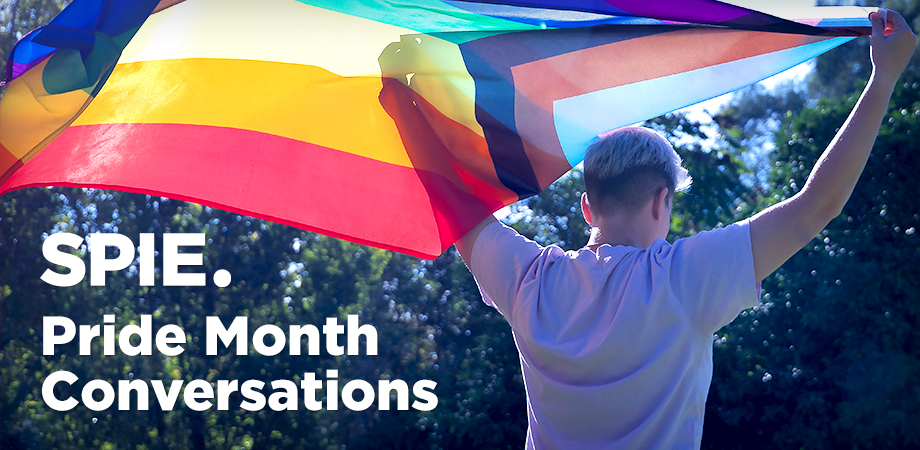Stories of Pride: Brandon Bakka

In celebration of Pride Month, SPIE spoke with members of our community about their experiences as LGBTQ+ scientists in optics and photonics as well as within the greater STEM community. Our fifth conversation is with Brandon Bakka, a PhD candidate at the University of Texas at Austin.
Bakka (he/they) is a PhD candidate in the department of Biomedical Engineering at UT Austin. His research involves the design and synthesis of lipid-based nanoparticles for biomedical applications, and he is advised by Dr. Tyrone Porter. In addition to his scientific research, Brandon conducts research on LGBTQ+ engineering students under Dr. Maura Borrego in the STEM Education Department. Brandon helped create a class for engineering students to read and discuss queer academic publications; and also created a faculty training process on LGBTQ+ student experiences. He has presented this training to each of the engineering departments at UT Austin and partnered with other students to present at the American Society for Engineering Education conference in 2021. Brandon identifies as queer.
 Is there an LGBTQ+ person in your life who has inspired you?
Is there an LGBTQ+ person in your life who has inspired you?
Growing up in a small town in Texas, I didn’t really know any LGBTQ+ people I could look up to, and the few I saw in the media were very removed from science and engineering. Even when I went off to college, I went to an engineering school with very few LGBTQ+ people and found myself on a fairly homophobic all-men’s floor. In my sophomore year however, I worked as a resident assistant and, by chance, happened to be in the only building with gender-inclusive housing. This led me to meet many queer students, and I got to see the wonderful community they made — they were so open with who they were and gave each other so much love and support. It inspired me. It was the first time I really saw that I could be openly queer and still have a supportive community.
How can allies actively support LGBTQ+ scientists and engineers?
A couple of actionable recommendations I often give in the trainings I present are:
- Provide your pronouns in your syllabi, email signatures, on office doors, etc., and give others the space to do the same.
- Work to use inclusive language in your teaching and research, and advocate for others to do the same.
- Refer to The NIST Inclusive Language Guidance and the APA Inclusive Language Guidelines for more information.
- Highlight the work and achievements of LGBTQ+ scientists and engineers in your field for your students and mentees.
Every place is unique, however, so being an ally can look different everywhere. I would recommend people seek out any LGBTQ+ organizations at their institution to see what work they are doing and how you can support them.
What is one piece of advice you can offer the LGBTQ+ scientists and engineers of the future?
Embrace how your queerness changes who you are as a scientist or engineer. As researchers, our desire for complete objectivity leads us to ignore social issues and consequently erase people with marginalized identities. Just remember that this division is not real: you bring your queer identity to everything you do and it gives you a unique and valuable point of view that we need in research. Embrace yourself and your point of view, and surround yourself with others who do, too.
EDI at SPIE
SPIE believes in the development of collaborative environments that value participation from individuals with different ideas, perspectives, and backgrounds, which ultimately have a positive impact on the science of light. Explore our EDI activities.
| Enjoy this article? Get similar news in your inbox |
|



